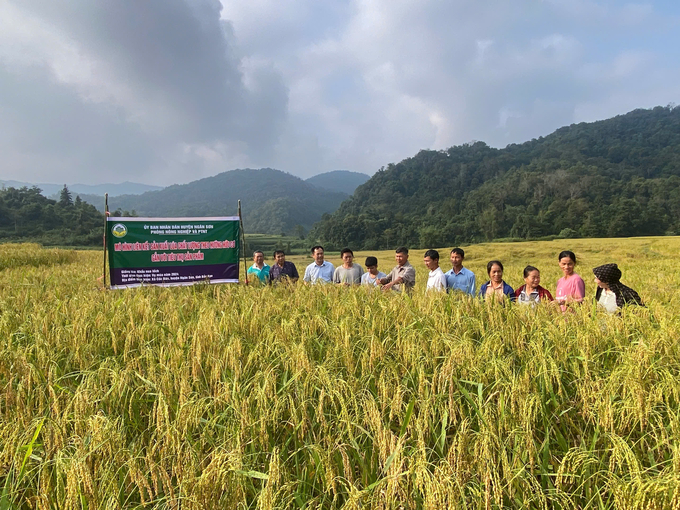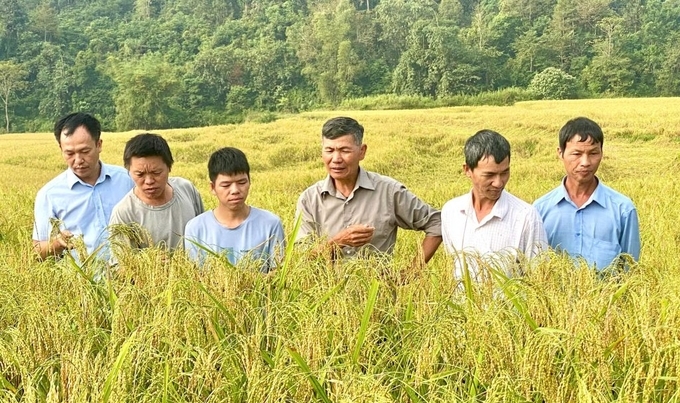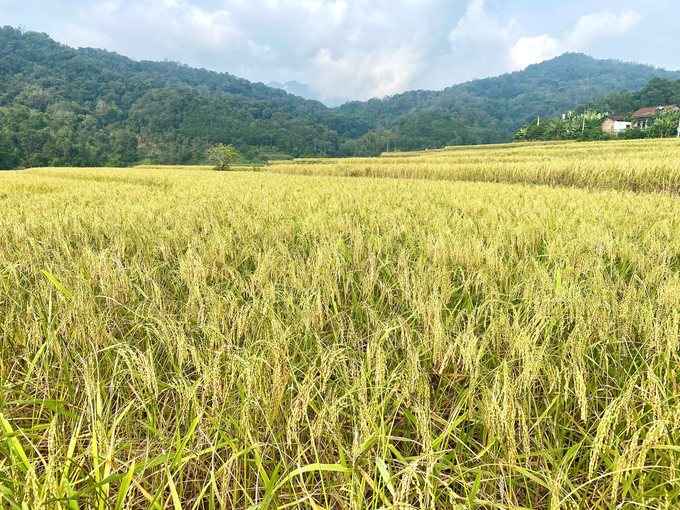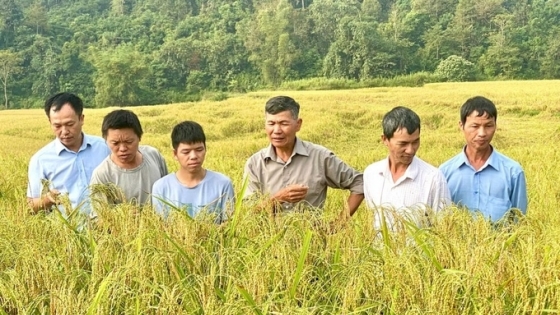(VAN) Mountainous people in Ngan Son district (Bac Kan) have stopped using inorganic fertilizers and switched to organic fertilizers to help the soil become healthy, increase productivity, and increase rice prices compared to traditional farming.

Organic rice farming model in Coc Dan commune (Ngan Son district). Photo: Ngoc Tu.
In recent years, from large-scale commodity production, Bac Kan province has focused resources and guided farmers to produce organic agriculture to meet the increasingly demanding tastes of consumers, bringing high and sustainable economic efficiency.
Thuong An is a purely agricultural commune in Ngan Son district (Bac Kan province), where the famous delicious Khau nua lech rice variety is grown. Since ancient times, people have cultivated this rice variety. However, traditional farming methods use many chemical fertilizers, negatively affecting soil quality.
Rice grown according to organic processes grows well, with high resistance to pests and diseases. During the crop, the entire area of the model does not spray pesticides, achieving good yields. Growing organic rice helps farmers reduce the cost of pesticides and spraying labor, chemical fertilizers, and many other expenses.
In 2024, 70 households in Na Hin, Ban Luoc, Na Bua, and Ban Slanh villages (Thuong An commune) will experiment with the organic cultivation of Khau nua lech rice. The model will be implemented on an area of over 25 hectares, and people will be supported with 100% organic fertilizer (including Que Lam KH08 fertilizer for basal fertilization, KH12 for the first top dressing, KH06 for the second top dressing, and biological products). In addition, households participating in the model will be supported with 100% of the cost of training in planting and care techniques, pest control, building contracts for product consumption, and recording production diaries. Before plowing, people will apply 800 to 1,000 kg of manure and 50 kg of Que Lam KH08 fertilizer/1,000 m2 of land. After 5 to 7 days of transplanting, continue to use the first top dressing with 35 kg of Que Lam KH12 fertilizer. When peeling the rice panicles, if there is a cotton mass equal to half a grain of rice or 10% of the female panicles are narrowed at the tip of the leaves, apply the second top dressing with 35 kg of Que Lam KH06 organic mineral fertilizer.
In Coc Dan commune (Ngan Son district), the model of linking high-quality rice production in an organic direction with product consumption is also implemented on an area of over 36 hectares, with 105 households participating.

The organic farming model helps rice plants grow healthy and improves the soil. Photo: Ngoc Tu.
Recently, after inspection, the professional sector of Ngan Son district assessed that pests and diseases on the model rice were less than those on rice fertilized with inorganic fertilizers. The yield of fresh rice in the model rice fields was higher than that of rice fertilized with inorganic fertilizers. In addition, organically cultivated rice fields produce safe products, aiming at commodity production and meeting consumers’ increasingly high-quality requirements.
Specifically, the dry rice yield of the model reached 420 kg/1,000 m2, and the yield in the same area for inorganic fertilizers was 395 kg. In addition to higher productivity, rice grown in an organic direction also has a higher selling price than traditional farming.
Ha Dong Yen, head of Ban Pau village (Coc Dan commune), said that because this was the first time growing rice in an organic direction, there were still some households that had not fully implemented the technical process according to the instructions and had no experience in checking for pests, leading to productivity not being superior to traditional farming. But what is clear is that the rice grains are beautiful and sell for VND 4 to 5 thousand/kg higher.
Organic rice production using the System of Rice Intensification (SRI) helps improve and protect the soil, reduce greenhouse gas emissions, adapt to climate change, protect public health, improve product quality, and increase economic efficiency.

In the coming time, the Ngan Son district will expand the Khẩu nua lếch rice cultivation area organically. Photo: Ngoc Tu.
The model in Ngan Son district also helps people get used to converting conventional farming methods to organic rice production, creating products that meet market standards. Mr. Nong Van Hoat, Head of the Department of Agriculture and Rural Development of Ngan Son district, said: With the connection of “4 houses”, the organic specialty rice production model helps farmers gradually change their awareness towards goods and environmental friendliness. In addition, households also increase their income, improve their health, and motivate farmers to continue expanding their acreage. This is the premise for implementing organic rice production models in the following years.
Growing organic rice on land in Bac Kan province helps people increase profits by about 30% compared to normal. This initial success is also the premise for Bac Kan province to transfer science and technology, expand organic rice growing areas, and aim to produce high-quality products.
Agriculture News | Agri Products Price



